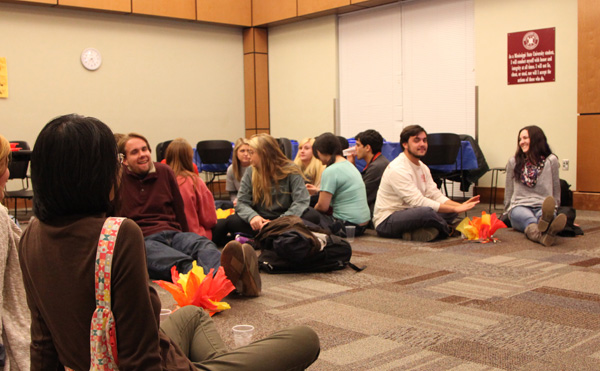Hunger banquet brings awareness to global food insecurity
January 23, 2015

Banquet attendees sit around makeshift campfires as they wait for dinner to be served.
STARKVILLE, Miss. — Joseph Mkomo has been laid off from his job picking coffee beans, which allowed him to provide the basics for his family in Kenya. His employer cannot afford to hire him for permanent work and pay him a stable wage.
Ilena Ruiz lives in El Salvador with her five siblings, who heavily rely on her income to survive. She has never complained about the hazardous working conditions at the factory where she works, but she has recently been fired. She has no savings and nothing to live on until she, hopefully, finds work.
Mkomo and Ruiz have fallen into the low income group.
Then there’s Peter Grisham – a middle manager at a large U.S.-based coffee company. He’s a hard worker and a devoted father of two young girls. His company’s profits have continued to increase and so, his income keeps him in the high income group.
Mkomo, Ruiz and Grisham were fictional characters used to tell a story during the Mississippi State University Engineers Without Borders Hunger Banquet, but they represent very real situations for families around the world.
“The global food crisis is an extremely pressing issue,” Engineers Without Borders president Laura Wilson said. “It does not only occur in third world countries, but right here at home.”
The idea of the Hunger Banquet is to bring the crisis to life for attendees while raising money for the group’s projects, including a five-year commitment to help bring clean water to the Simwatachela Chiefdom in Zambia.
Paying $5 a ticket, guests at the interactive dinner were seated in one of three different income groups representative of the world population. Throughout the evening, participants were chosen to represent individuals in each level. As the evening continued, individuals either moved or remained in their income levels based on their character’s circumstances.
The lowest income level had the most members. The group represented Simwatachela and the living situation the Engineers Without Borders students have observed and been part of during their work in the area. Individuals in this group sat around a makeshift camp fire on the floor and dined on tomato soup and crackers.
The quality of the meals progressed with each level. San Salvador, El Salvador represented the middle income level and its members were served vegetable soup and a salad. The participants in the highest income level, Starkville, Mississippi, had a full course meal which included spaghetti, bread and salad.
Accounting major Markitia Yates was placed in Simwatachela, Zambia, but was fortunate to move up to the middle class, which she described as “the best” feeling.
“It’s not just the food. You feel sad; you’re down there watching what everybody else has and you’re hoping to get it,” Yates said.
James Grafe, a junior mechanical engineering major, said he was surprised to learn how simple things such as the price of coffee changing could have such a big impact on people.
“Six people had to move up to the middle class and others moved down just because of the change in one little thing,” Grafe said. “It definitely opened my eyes to what’s happening, and the percentages are especially interesting. I didn’t realize that big of a percentage actually doesn’t have enough to sustain themselves.”
The hunger banquet raised about $500, which will cover one-fourth of the cost of a well that the Engineers Without Borders will install in Simwatachela. Over the course of its five-year commitment, the group plans to install at least eight wells in the region, which will bring clean water to thousands of individuals.
“It’s a small way to our overall goal, but it’s a pretty good amount to raise,” Wilson said. “We’re happy with it, and we’re hoping to do a lot more next semester.”
For more information about Engineers Without Borders, visit www.ewb-usa.org or like Engineers Without Borders-MSU on Facebook.
To read about the group’s first installations in Zambia, visit www.alumnus.msstate.edu/Winter14/deepwater.html.
By: Jen Nguyen
